Eubie Blake: From Mouse To Lion
Eubie Blake seemed to know exactly what he wanted to do with his life from the time he first embarked upon it. He was born to former slaves, Emma and John Sumner Blake, on February 7, 1883 in Baltimore, Maryland. Eubie proved to be a torment to his mother, a demigod to upcoming Black musicians, and a credit to American society. How was Eubie Blake different from other pianist/ composers? What sort of a legacy did he leave to fellow musicians and fellow humans? What was his philosophy of life? Did he “practice what he preached?” Who was Eubie Blake?
When Eubie Was A Boy
Baltimore in the late 1800’s was an elegant woman picking herself up after being thrown by a horse. This was the time of Reconstruction after the Civil War. The South, our elegant lady, was in the process of letting wounds heal, reviving and rebuilding. For Negroes it was a test of their ability to “…survive hardship and deprivation in a hostile environment,” according to Lawrence T. Carter, a Detroit journalist who wrote a book called “Eubie Blake: Keys of Memory.” For Eubie’s parents, John and Emma, it was a time of making do with what they had and scraping to make a decent living for their family.
Emma, small, tough and fervently religious, gave birth to 12 children, only one of whom lived past infancy – Eubie. Of course he was the apple of his mama’s eye. But her feelings never stopped her from being a disciplinarian, rigid in her religious beliefs. Eubie’s father, John Sumner Blake, was a stevedore at the Baltimore docks. During times when he was unemployed, the family lived on the fantastic income of $90 every three months from his Civil War service pension. Emma “washed and cleaned for white folks.” (LT Carter)
John and Emma Blake had been slaves in Virginia and came north to seek a better life. Neither John nor Emma were musically inclined, except for Emma’s love of gospel music; she crooned hymns to her son in his crib.
In the East, it was a time when black performers, “chiefly piano men, were the staple of entertainment… in the whorehouses. Itinerant black piano plunkers had begun to trade, embellish and codify the swelling African music which they felt within themselves.” The music of today – “all forms of jazz, gospel and rock” – evolves from the “dark bayous and backwater of ragtime” (LT Carter). This was the stage set for Eubie Blake.
Showing His Chops
One day when he was six years old, Mrs. Blake took her son into a department store where he strayed from her side and wandered into the musical instruments section. He climbed up onto an organ stool and began picking out tunes on an organ. The store manager, impressed with Eubie’s ability, convinced Mrs. Black to purchase a $75 piano for $.25 a week. Emma relented as long as her son would play only religious tunes.
Eubie began taking classical piano lessons from a neighbor. He integrated this education, music he heard on the street and the “rhythms and syncopations in his mother’s own Baptist church,” into his style. As he matured, his mother would wail, “the devil got in his fingers!” And: “Take that ragtime out of my house!”
At twelve, Eubie “Hubert” Blake was busy with his passion. He felt, lived and played his music. Twelve was when he sang outside local bars with a group of friends for change. And twelve was when he first got drunk. It was Christmas. Eubie’s father went out that afternoon with no money for presents, no money for food. He returned later with a ham, a turkey, sweet potatoes and the works, with a quarter left over for Eubie. Eubie later got drunk on fifteen cents’ worth of liquor. His father found him weaving in the street, brought him home to Mrs. Blake who “could smell whiskey on your breath if you were in Los Angeles and she was in Baltimore,” as Eubie Blake was later to say.
How the Mouse Came to Be
One day Eubie watched as a friend damaged someone’s property, and stayed on the scene after his friend had run away. When asked who had thrown the rock, a woman witness pointed at Eubie and said, “That mouse-faced boy.” Eubie thereafter became known as “Mouse” to his friends.
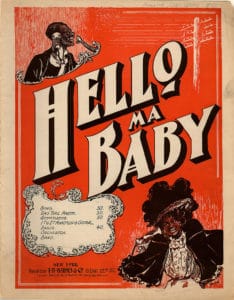 With his long fingers and piano-key-sparking talent, Eubie found himself a job. At fifteen, still wearing short pants, he played piano in Aggie Sheldon’s bawdy house. He was paid $3 for a seven-day week plus tips which were lavish. For the white ladies of the evening, he played the greatest hits of the times: “After the Ball,” “Maggie Murphy’s Home,” “Hello! Ma Baby,” “Doobye Dolly Gray,” “Any Old Rags?” and ironically, “A Bird in a Gilded Cage.” Before long, Eubie started to wear a pair of long pants that came up to his armpits. He could consume two quarters of champagne in an evening without any discernable effect.
With his long fingers and piano-key-sparking talent, Eubie found himself a job. At fifteen, still wearing short pants, he played piano in Aggie Sheldon’s bawdy house. He was paid $3 for a seven-day week plus tips which were lavish. For the white ladies of the evening, he played the greatest hits of the times: “After the Ball,” “Maggie Murphy’s Home,” “Hello! Ma Baby,” “Doobye Dolly Gray,” “Any Old Rags?” and ironically, “A Bird in a Gilded Cage.” Before long, Eubie started to wear a pair of long pants that came up to his armpits. He could consume two quarters of champagne in an evening without any discernable effect.
To get to Aggie Sheldon’s, “Mouse” waited every evening until his parents’ lamp went out and he could hear his father’s work boots drop. Out the window he flew, down the shed roof and over the fence, straight to the pool room for the long pants he rented from Rabb Walker, then off to Aggie’s to play piano. (from Reminiscing With Sissle & Blake by Robert Kimball & William Bolcom)
Wobble-Wobble Secrets
Eubie kept his career a secret from his parents until one day when a neighbor lady told Mrs. Blake she had heard coming out of Aggie Sheldon’s piano playing that could only be Eubie’s – because of the “wobble-wobble” in the left hand – a sort of reverse boogie bass which came to be Eubie’s trademark.
This brought on the conflict with his mother which he had feared. After the discovery about her son, Mrs. Blake called father and son into the room and said to John, “Do you know that Mr. Blake (which she called her son when she was displeased) has been playing in a bawdy house?” Mr. Blake took his son outside and questioned his son, “How much money have you been making, boy?” Eubie replied by taking his father upstairs, to show him $100 stashed under the carpet. John Blake himself made $9 a week.
Eubie’s mother could not keep him from pursuing his career. He continued to work at the bordello, then others, while still living under the roof of his parents. He always remembered her “quick darting eyes” at moments before she unleashed one of “Jehovah’s thunderbolts” at his sinful head, and even in his twenties asked her to restrain her vengeance because “I look so bad up there on stage with all those welts.”
Ragtime – “The Devil’s Music”
Mrs. Blake was perhaps conflicted for having bought her son a piano and investing in lessons while opposed to “the devil’s music,” ragtime, which Eubie loved to play. Once on a streetcar, she said of his pianist’s hands, “Double those fingers up! You look like a pickpocket!”
One of Eubie’s jobs, after Sheldon’s, was to be “Professor Hubert Blake,” who played a melodeon – a small reed organ – while buck dancing on the tailgate of a horse-drawn wagon. It was 1901. By 1902, Eubie had gotten himself a new job buck dancing in “Old Kentucky,” a colored minstrel show in New York City.
Sawdust and Rough Language
Back in Baltimore, Eubie became a relief pianist for Big Head Wilbur at Alfred Greenfield’s Saloon for $1.25 a night. Inside the joint there were no chairs, only beer barrels and boxes scattered about big round iron tables. The floors were covered with sawdust. The upright piano was still in its packing crate when Eubie first arrived. But he got it to play for the pimps dressed for the evening in their full-backed coats, tight-legged pants, Stetson hats, gold watch chains and diamond rings.
Here there were many fights and a lot of rough language. But if a woman ever entered, someone would shout, “Heads up, men!” and all the vile talk would cease. Eubie later said, “I worked form 4 PM till midnight. The sawdust was so high it was above the soles of your shoes. When I came home, my mother would say, ‘Don’t bring that stuff in here. Kick it off!’ She’d stay up until I got back, waiting to make sure I kicked off all the sawdust!”
Or perhaps she had been waiting up, as some mothers do, to see that her son was okay.
During the early 1900’s Ragtime was all the rage. The ragtime pianists, reveling in their art, called themselves by such names as The Shadow, Jack the Bear, Big Head Wilbur, No Legs Casey, Abba Labba, Cat-Eye Harry, Boots Butler, Sparrow, Seminole, Slue-Foot Nelson, Sheet-Iron Brown, Wild Cat Joe, Black Diamond, Squirrel and John the Baptist (from Reminiscing With Sissle & Blake)
The Piano Saved His Life
Eubie Blake ended his bawdy house career after one evening when, mistaken for one of the bartenders at the Middle Section Assembly Club, Blake was shot. Ducking behind the piano saved his life.
Between 1906 and 1907 Eubie spent summers playing piano in Atlantic City where he met, competed with, influenced and was influenced by other musicians. One of these was One-Leg Willie Joseph, whose leg had been lost in an ice-skating accident. He was a prize piano student at the Boston Conservatory who influenced Eubie with the dramatic soft and loud contrasts of his music.
The Development of His Own Style
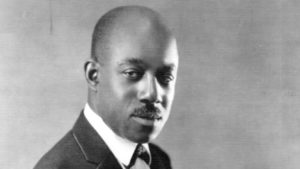
Eubie Blake
Eubie worked hard to develop his style, with emphasis on learning “tricks” that he, and he alone could play. Like his childhood games, he made a challenge of piano-playing to himself and others. An artist develops his or her creativity simply by developing themselves. This Eubie accomplished. Despite his mother’s negativity and sometimes ferocity, Eubie Blake grew into the shoes he had planned to wear from early on. He began composing his own music. His trick was to accent on-the-beat, off-the-beat, and in-between in an “angular but flowing melodic sense, full of surprising leaps and turns.”
In 1910 he married Avis Lee of Baltimore, who herself was an accomplished classical pianist, an ex-schoolmate of Eubie. He used to say she was one of the ten most beautiful girls in Baltimiore.
In 1910 Eubie also wrote “Troublesome Ivories,” a tune with which he wanted “to cut everybody with.” This composition was difficult even for him to play.
From 1910 until 1915, Eubie again spent his summers in Atlantic City. He performed at such places as the Belmont, the Bucket of Blood, Kelly’s and Ben Allen’s. During this time he wrote some of his most famous ragtime. He also accompanied for singers Madison Reed, Mary Stafford (a great star of the day), Lottie Dempsey, Big Lizzie and Alabama Blossom.
The Dixie Duo
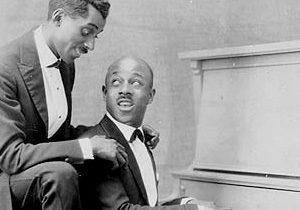
Sissie and Blake
Sometimes “destiny” comes into play at “the right time.” It was in 1915 when Blake met Sissle, his partner-to-be. Blake, 32 – ragtime pianist and composer, wedded his talents to those of Noble Sissle, 25, a singer and lyricist from Indianapolis. They brought their first collaboration – “It’s All Your Fault,” to Sophie Tucker, at the Maryland Theatre. The ink was still wet, and by the time Sophie held it in her hands the ink had run so badly the music was nearly unreadable. But “bless her heart, she learned it, had arrangements made, and sang it in the same week,” Sissle would later say.
Len Lyons, in “The 101 Best Jazz Albums” said, “Their most powerful imprint upon the American theatre was made with the 1921 black musical “Shuffle Along,” which ran for a year and a half on Broadway. The songs “I’m Just Wild About Harry” and “Love Will Find A Way” became national hits, the former used as Harry Truman’s anthem in the 1948 presidential campaign. Eubie Blake initiated the heyday of the black musicals, and his work was in demand through the 1920’s.
He Might Have Done It For Jesus
“Eubie’s mother, however, was not won over by her son’s success. “They All Played Ragtime” tells of a gala performance of “Shuffle Along” in Baltimore in which blacks by special permission were allowed to sit in the boxes. When the elderly Mrs. Blake was congratulated at a backstage party on Eubie’s great achievements, she replied, “Some may see it that way but he might have done it all for Jesus instead.”
Sissle and Blake – the “Dixie Duo” – were one of the first Negro acts to play without burnt cork. Eubie used to laugh, much later, talking of their beginning: “Some agent had a smart idea for an act for us. We were supposed to shuffle on stage in blackface and patched-up overalls. In the middle of the stage there is this big box with a piano in it. The idea was to look at it as it it were from the moon and I’d say, ‘What’s dat?’ and Noble would say, ‘Dat’s a py-anner!’ and then we’d do our act.
Well, Pat Casey (their agent) would have none of that. He told the agents that Sissle and Blake had played in the houses of millionaires and the social elite and they dressed in tuxedos and he’d be damned if he’d let us go on stage in old overalls and act like a couple of ignoramuses.”
Eubie’s wife, Avis, died in 1939. He did not marry again until 1945 after he fell in love with Marion. He and Noble Sissle remained partners for fifty years. They collaborated on more musical comedy.
A Strong Will to Live
Eubie Blake’s career, and life, did not end until he died in February 1983, one hundred years after he had been born. His friends later said of him that they knew his spirit was hanging on, more than the body, because of his strong will to live. Eubie himself had made the claim that he would cut up – outlast – his musician friends, as in his piano-playing. He always said he wanted to live to be a hundred. And he did, even though he smoked and ate sweets!
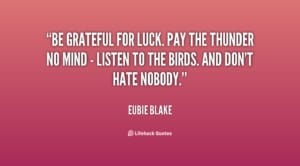 Just before Eubie died, the City of New York held two grand events celebrating his centennial. Eubie had pneumonia and couldn’t leave bed to attend; but music from the 24-hour jazz concert at St. Peter’s Lutheran Church was telephoned in to him on a special apparatus. The other event was an all-star musical tribute to Eubie Blake, at which he was certainly there in spirit.
Just before Eubie died, the City of New York held two grand events celebrating his centennial. Eubie had pneumonia and couldn’t leave bed to attend; but music from the 24-hour jazz concert at St. Peter’s Lutheran Church was telephoned in to him on a special apparatus. The other event was an all-star musical tribute to Eubie Blake, at which he was certainly there in spirit.
The Indestructible
Eubie “The Indestructible,” as some called him – a man whose fingers could span twelve keys, ragtime pianist/composer and vaudevillian. Someone who wrote 3,000 tunes in his 100 years. A man who made a mark on not only his own life, but the lives of people everywhere. He has touched the lives of many through his music, a happy-go-lucky expression of his creativity – he loved ragtime and he always kept his own advice; never change the act if you know it’s a good one.
New York Governor Mario M. Cuomo expressed the feelings of many when he composed the following mailgram to Eubie Blake for his centennial birthday:“We have all been enriched by your extraordinary contributions to the music of this century. You are truly one of our greatest treasures.”
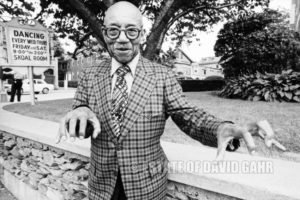
Eubie Blake playing “air piano”
Eubie thought that music was something that could last a lot longer in the minds of some people than he himself could. But his dictum was never to fret about it.“If you lose somebody, you don’t go to pieces over it. You can see they’re gone and the world is still here. If it was you that was gone, it would still be here, too. But you got to get up and go out and live your life.”
Farewell to Ragtime’s Apostle of Happiness
This Eubie did. At 90, “Eubie had a spring in his step, jumped out of his chair whenever a lady entered the room and could recall 1907 and last week with equal alacrity.” So wrote Lynn Norment in an Ebony article called “Farewell to Ragtime’s Apostle of Happiness.”
Nearing his 100th birthday, while sitting at a table with a man in his forties, a beautiful woman moved across the dance floor. Eubie’s friend said “Ahh! I wish I I was twenty again!” Eubie looked at her and said “Ahh! I wish I was ninety again!”
His memorial service, held in the church where eleven days earlier, thousands of people had celebrated his birthday, began with this prayer: “Thank you, Jesus, for Eubie. Amen.”
He could play the piano like an angel and finally he was among the angels.







